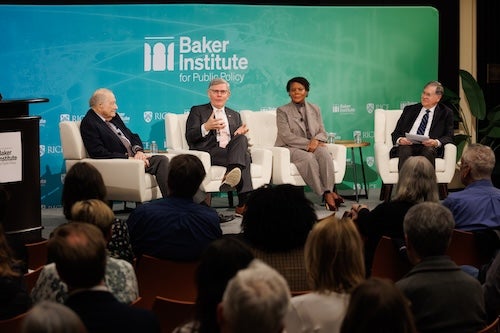Three former presidential science advisers spoke with the director of Rice University’s Baker Institute for Public Policy March 5 to discuss the critical role of science and technology in a complex world. The conversation explored the panelists’ experiences leading the White House Office of Science and Technology Policy (OSTP) and the office’s critical role in shaping national policies to advance science, technology, innovation and higher education.
David Satterfield, the Baker Institute’s director and a former U.S. ambassador, spoke of the urgency of conversations like this.
“Science itself, the scientific method, facts and data — often a century or more established — are facing enormous challenges from declining public trust mercilessly fed by social media and by those in a position to influence public opinion, science and scientists,” Satterfield said. “The trust is declining.”
Alondra Nelson, presidential science adviser for Joe Biden, explained that the pace of the White House far exceeds the typical pace in academia. This requires trust in yourself and your team, she said.

“You really have to draw upon a kind of storehouse of knowledge that you’ve learned and really trust yourself,” Nelson said.
OSTP is a small agency compared to others, but employees are sourced from all over the country and represent fields such as the military, industry and academia, she added. It resides in the executive office and its job is to advise the president, so the director of OSTP is a position confirmed by the Senate.
“His or her job is to make sure that the president knows what the scientific basis is for any policy decision that’s being made and make sure the president knows developments in science and technology that he otherwise might not know about, that you think are very important to the country,” said Neal Lane, senior fellow in science and technology policy at the Baker Institute and former presidential science adviser for Bill Clinton. “The Office of Science Technology Policy must have experts in pretty much all fields of science, even though you can’t cover everything. The rest of their job is to coordinate activities across agency lines all across government.”
The office brings together the “cream of the crop,” said Kelvin Droegemeier, presidential adviser during Donald Trump’s first administration.
“We get phenomenal folks at OSTP,” Droegemeier said. “And then they take something back to their agency. When they go back, when their detail is ended, they take back this tremendous knowledge of how the White House works.”
A lack of trust in science from the public has reached a high-water mark, Nelson said. She acknowledged that the successful federal funding of scientific innovations in the past did not necessarily bring the public into the conversation.
“There’s lots to say about the disruption that we’re living in in the science ecosystem,” she said, “but some of that is that we need an understanding of science … certainly that there are true facts in the world and that there are things that can be known and should be known by the scientific method, but there are a whole universe of other things around this that are going to take policy and people talking to each other and other kinds of social endeavors.”
View the entire discussion here.
The event was complemented by an exhibit inside Baker Hall that displays the history of science advisers and the role of OSTP in presidential policymaking. Exhibit materials were curated from the collections of U.S. presidential libraries and the White House Scientists Archive in the Woodson Research Center Special Collections and Archives at Rice’s Fondren Library. The event followed the annual Baker Institute Civic Science Lecture presented by Darío Gil, chair of the National Science Board and vice president for research at IBM, on March 4. Together, these events highlighted critical issues facing the U.S. national research and education enterprise.
This event was organized by the Baker Institute Science and Technology Policy Program and Rice Innovation. Additional support was generously provided by gifts from the Kavli Foundation and Rice’s Fondren Library, Wiess School of Natural Sciences, Science and Technology Studies Program and Creative Ventures Fund: Conference and Workshop grant.

